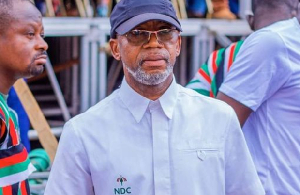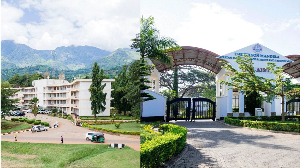Traditional dancers celebrated in front of a cardboard replica "oil boom." 120,000 barrels of oil a day is calculated. Pleasure is mounted in Ghana about the oil discovery and production of oil. A dream has come true. During the ceremony, the dancers moved on rubber boots and carrying the wax jackets, oil field workers about the colourful costumes. In 2007, large oil reserves found off the coast of Ghana.
Ghana oil field now, "cheers" ("the Jubilee") officially opened. Ghana is now entering the ranks of the oil-exporting countries.
"This is a gift from God, resource that belongs to all the people of Ghana, including the generations yet to be born," said President John Evans Atta Mills on the occasion of the beginning of the promotion." "I've always said and will say further the money that will come from the oil will benefit all Ghanaian people, and not just a few."
The oil field is estimated to a volume of 1.8 billion barrels, 120,000 barrels a day, in three years time the production will shoot up to 250,000 barrels a day, more than double. The oil export commenced in January. How much falls ultimately to the state is unclear. Estimates range between 400 million and a billion dollars. Ghana's budget currently stands over 5 billion. "A historic event," Ghana government newspapers cheered when the president symbolically opened the oil production.
The past has shown, however, that oil discoveries in developing countries are not just a blessing. Especially in nearby Nigeria (with an estimated oil reserves of around 37 billion barrels), it always comes back to violent attacks by rebels: Pipelines are destroyed with dynamite and hand grenades, workers taken hostage. The reason is, the money from the oil reaches everywhere, except in the pockets of the Nigerian people. Due to this dissatisfaction many Nigerians sympathize with the rebels. Also in Angola, it came after the oil discovery (13.5 billion barrels) to civil war-like conditions.
"It is hoped and assumed that the oil production in Ghana would be very peaceful more than any other oil producing country in Africa, because the democratization of Ghana is one of the best and advanced in African. The country is stable and as the second largest gold and cocoa exporter in Africa, has experience in the trade.
BUT !! BUT !! BUT !! Corruption and transparency, which is the biggest danger in the country is still haunting the majority of the Ghanaian people, even though somewhere a month or two ago "Ghana Petrol Revenue Management Act: a law to manage oil funds is approved in Ghana.
Very unfortunately the relevant body appointed to manage Ghana oil funds are only persons appointed directly by President Mills. The flabby laws passed over the management of the oil fund does not contain any key distribution. It is therefore open as to what will happen to the money. "This makes the Ghana Petrol Management Act (law) unlawful" and sounds like a tactic to deceive the people of Ghana.
The worst of all is using the oil profits in the future for loans as collateral which could generate a big heat in the near future when the Ghanaian people will reprove the collateral agreements by the government and the Ghanaian population will feel deceived.
Already there is a problem that, most of the oil workers are provided by the Irish exploration company,Tullow Oil, according to Tullow oil Ghana hasn't got enough qualified personnel.
What does the oil production in the country mean to it's people, if Ghanaian individuals are not even aware of how much money or profit the country will get and secondly the Ghanaian citizens can't benefit from the oil production in terms of jobs?
Is there anything at all in the oil production "that is good for the geese which can equally be good for the gander"?
FRANCIS TAWIAH (Duisburg - Germany)
Opinions of Tuesday, 22 February 2011
Columnist: Tawiah, Francis














